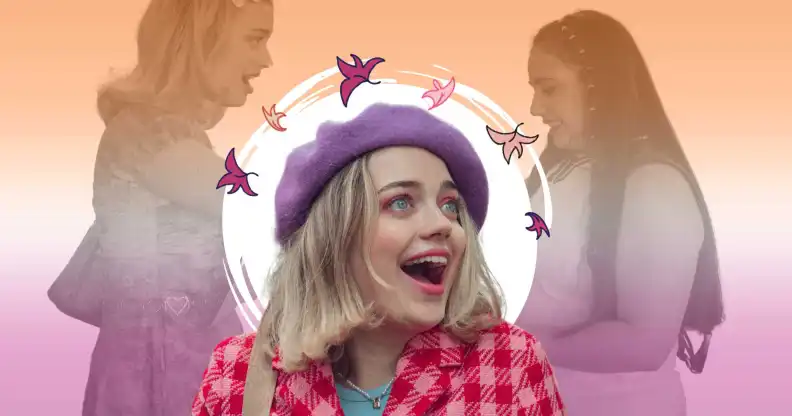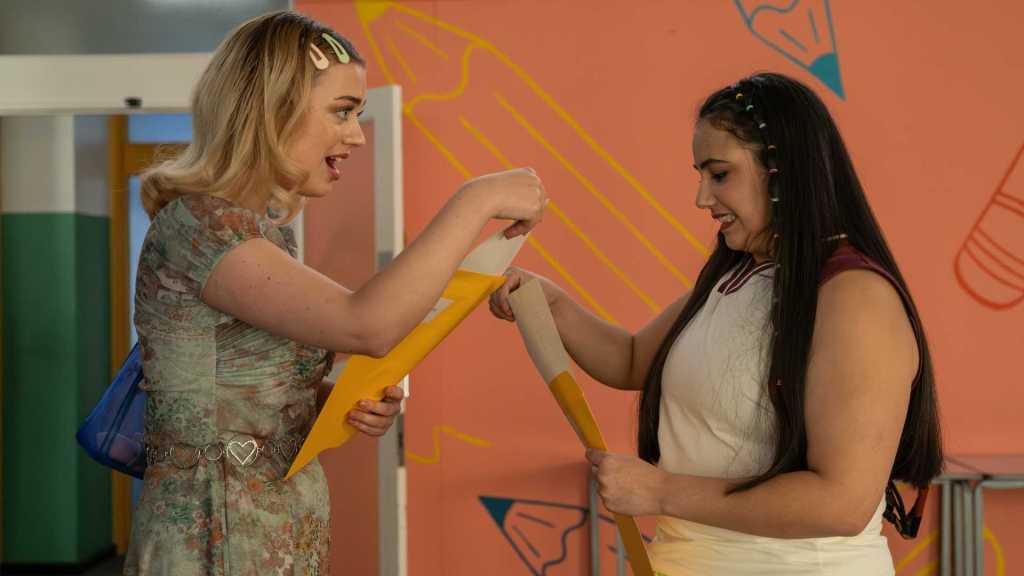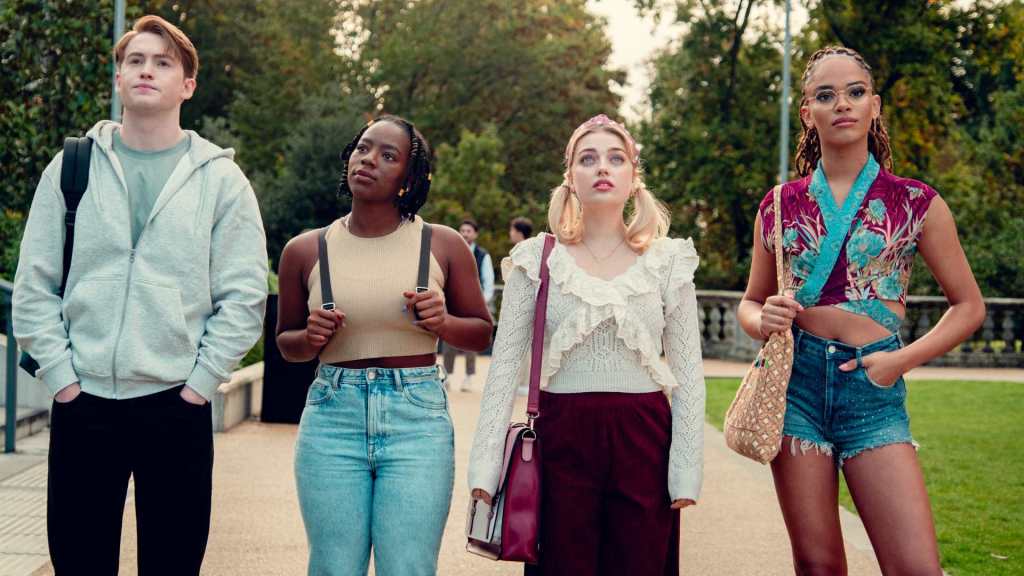
(Netflix)
It’s a canon event for sapphics: queer girl falls in love with her straight best friend but is left broken-hearted by the yearning, rejection and confusing closeness of female friendship. “An inch away from more than just friends.” Chappell Roan’s lyric in “Naked in Manhattan” summarises it with stunning accuracy.
(Warning: spoilers for Heartstopper season three follow).
Reading between the lines in Heartstopper‘s second season, that is how bisexual Sahar Zahid, played by Leila Khan, felt when her straight best friend Imogen Heaney (Rhea Norwood) stopped texting her as soon as she got her first boyfriend – the once close pair drifting apart because of it.
However, following one specific scene in the season two finale of the hit Netflix show, which is based on Alice Osman’s graphic novels, fans were convinced that hyper femme, self-proclaimed LGBTQ+ ally Imogen is actually less than 100 per cent straight, and is, perhaps, undergoing a sapphic awakening after a life time of heterosexuality.
They were sent into a frenzy when Imogen gave a loving, longing glance at Sahar at the school prom, pointing out that the un-heterosexual moment was tinged by lesbian-flag-coloured lighting and could be a hint at a potential season three plot focusing on Imogen’s sexuality.
“I believed Imogen was a lesbian [from] season one,” one fan wrote on social media at the time. “Then there’s Sahar. We learn that they used to be friends, but then Imogen got a boyfriend and suddenly stopped texting [her]. A gay story as old as time, if you ask me.”
Others pointed out that the way Imogen navigated her relationships with boys she fancied could signal repressed queerness because she never said she was explicitly attracted to them, instead citing reasons such as that they hang out before school together or that they have known each other since childhood as the basis for a relationship. Once, when Elle (Yasmin Finney) asked Imogen why she even liked closeted bully Ben (Sebastian Croft), she stayed quiet before changing the subject.
Heartstopper fans who waited impatiently to find out if Imogen would get a queer storyline, no longer have to twiddle their thumbs, after season three arrived on Thursday (3 October).
Imogen’s journey, while we wish it could have been explored in more depth, is one to which we can all relate.

For much of the first half of season three, Imogen and Sahar appear peripheral to the main group, especially with Charlie navigating mental-health issues and Nick doing all he can to support his boyfriend.
But in episode three, the two girls are huddled close together feeding a goat during an outing to the zoo for Nick’s birthday, prompting Darcy to turn to Tara and cheekily say that their behaviour “seems a bit gay to me”.
Maybe this was a little nod to the viewers’ detective work at the end of season two, and confirmed to us that Imogen’s Big Gay Awakening was on the cards. Heartstopper certainly doesn’t queer-bait its audience.
We didn’t have to wait long for it. In the next episode, Imogen and Sahar are caught drunkenly snogging during a Halloween party, only for the former to laugh it off as a booze-induced fumble.
“Is this a joke to you?” Sahar snaps, obviously hurt and no doubt feeling invalidated in her own identity, before storming off. It’s a scene that makes twice as much sense a few episodes later when she admits that her attraction to Imogen was what helped her realise she’s bisexual.
“Everyone kisses everyone when they are drunk,” Imogen emotionally slurs to Nick later that same evening, her head over the toilet bowl as she vomits. “I’m allowed to experiment. This is like when I got a boyfriend, and she got mad at me for no reason.”
Side note, Imogen is dressed as Barbie for the party, an interesting choice given the strong belief in sapphic circles that Margot Robbie’s character in last year’s hit film was a lesbian, and the fact that Norwood said Billie Eilish’s “What Was I Made For?”, from the soundtrack, guided her character’s journey in season three.
“Girl, just talk about how you are feeling!” is what you want to shout at the screen, knowing full well that Imogen is repressing the real reason she kissed Sahar.
Our need to shake Imogen and make her see sapphic sense only intensifies during the Christmas season episode when Sahar texts Imogen to say she looks “cute” in a festive outfit. If there was an award for best representation of gay panic on screen, it would go to Norwood for the nervous-but-elated expression she gives as Imogen thinks what to type back.
We’ve all been there, we’ve had a moment where a very pretty girl we are pals with compliments us and we simply don’t have a clue how to react. Do we want to be very best friends in the whole world with her… or something more?
(Repress, repress, repress).

Much of what viewers previously noted about Imogen’s character in her relationships with boys comes to the surface towards the end of the season, when she and Nick share a hotel room while others check out universities.
Sitting opposite each other on separate beds, Imogen asks Nick if he minds sharing with her because “girls and boys sharing a room…” she trails off.
While perhaps a throw-away piece of dialogue, it actually echoes the words of lesbian journalist Kaycia Ainsworth who spoke to PinkNews about Imogen after season two premiered.
“When I was growing up, the conversation was always [whether] men and women can ever truly just be friends, and these kinds of things always made you feel as though your purpose in relationships with men was always to try to date them,” Ainsworth said. “You just kind of fall into the trap of doing that and you don’t ever actually ask yourself if you’re happy doing it. You just go along with it.”
It is Nick saying that boys and girls can be just friends which prompts Imogen to reveal she never liked him in the first place.
“I think I kind of felt pressure to have a boyfriend,” she says nervously. “You know, because I was a cool girl and that’s what cool girls do. And I think… I liked having attention from boys. It made me feel important and like I was doing life right.
“I don’t think I liked Ben either or my year 10 boyfriend. I don’t think I’ve ever liked a boy, actually,” she says in a whisper, “when I really think of it.”
Imogen’s experiences are a direct mirror of comphet, a concept coined by lesbian feminist Adrienne Rich in the 80s, the idea that a woman is automatically assumed to be heterosexual and thus heterosexuality is enforced upon them by a patriarchal, heteronormative society.
Being straight is not any more “natural” than being gay, bisexual or anything else, but it is imposed on women which results in queer women – possibly unconsciously – performing straightness to the detriment of their own happiness.
This can include feeling compelled to date men, pretending to crush on male celebrities, pushing away all queer feelings, positioning themself as a “straight ally” and dressing and acting in a certain way – or not in a certain way.
Having grown up as a closeted lesbian, Imogen’s journey through a compulsory heterosexuality and lesbian existence mirrors much of my own and probably many other queer women’s experiences.
I tried to like boys, I really tried. I had a boyfriend, I talked to my friends about boys, I kissed boys in clubs, I lied that I fancied Niall Horan and Logan Lerman. When I first kissed a girl I hid it, like a dirty secret.
But, of course, all that lying and suppression did not change a single thing about me.
And it doesn’t seem to have changed anything for Imogen either.
Heartstopper season three is streaming on Netflix now.
Share your thoughts! Let us know in the comments below, and remember to keep the conversation respectful.
How did this story make you feel?
